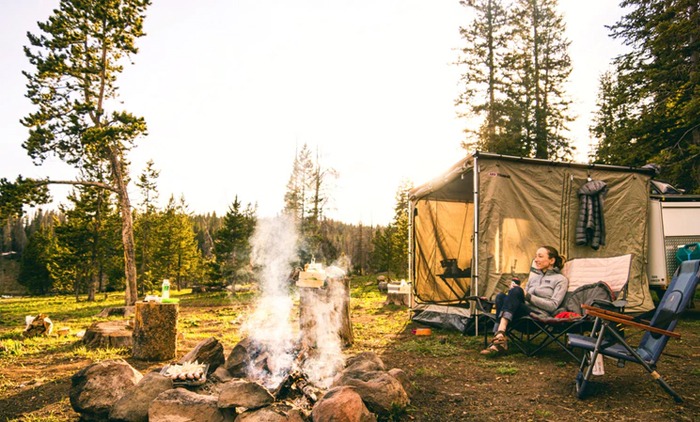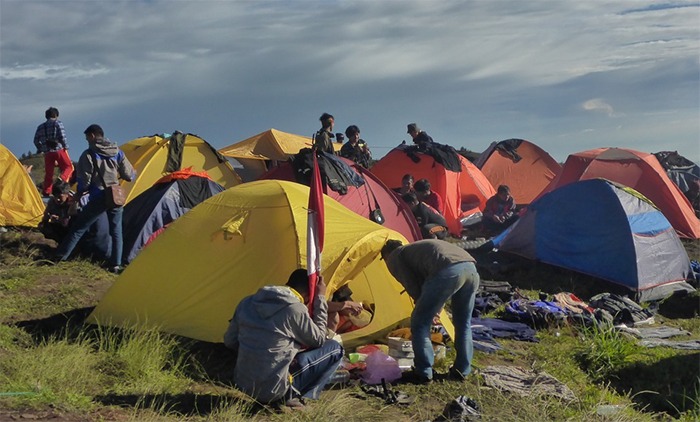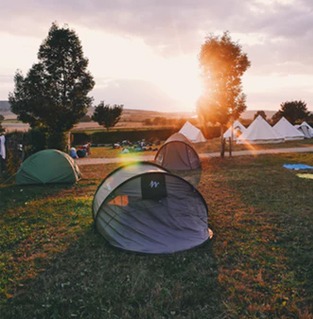A beginner backpacker may have many things going on in their mind like “what to pack?”, “where to go?”, “where to stay?” etc., and if you are one of them, then don’t worry, we have prepared a guide for you that includes the best backpacking tips.
Don’t consider outdoor backpacking too difficult, it is incredibly rewarding because spending some time in nature, away from civilization, can have a positive effect on your health and mind.
Here are the 7 best backpacking tips for all the beginner backpackers out there:
1. Choose A Nearby Backpacking Destination
You don’t have to challenge yourself when it comes to backpacking (especially when you are a beginner) because if the destination is too hard, it will make for a miserable experience and if it is easy, it will give you some extra time to explore the area really well and enjoy every bit of it.
Choosing a nearby destination for backpacking will enable you to reach the camp before dark and you don’t really have to drive a lot which ultimately means spending more time hiking than driving. First, it is important to practice (backpacking) rather than doing something you never did; and choosing a destination that is not much far away will surely help.
2. Buy Some Help
Buying some help means investing in a local guidebook and a waterproof map that will assist you throughout your backpack journey. A local guidebook contains all the important information such as backpacking routes, trails, treks, and campsites in the area you are planning to go. Guidebooks are normally sold along with a waterproof map so make sure you get one. And don’t rely on your device to have all your information – it may not always be charged up or have access to the net.
A beginner can gain a lot of knowledge about the local weather pattern, terrain, and wildlife and insect activity. The combination of a guidebook and a waterproof map will help you plan better and reroute in case you forget the trail. Another thing you can do to shave some weight off your backpack is by photocopying the pages from the guidebook and taking only them with you rather than the whole book.
3. Hike a Short Distance
If you are a fan of hiking but still a beginner, we suggest that you should not make things complicated for you in the start by doing a long hike. You can take a 3 to 5 miles hike to the campsite on your first trips and then gradually increase the distance as you get more experienced.
Short distance hikes will enable you to arrive without getting much tired and having huge blisters on your feet. You will also have plenty of time to set your tent and prepare dinner before nightfall. But sorry to say, if you don’t develop a good backpack routine, your whole experience might get ruined.
4. Only Pack What Is Essential
Newbies who don’t know how to backpack the right way would try to fit everything in their backpack which isn’t a good practice because more weight will cause a lot of problems like a backache, shoulder fatigue, etc. that will ultimately slow you down and tire you out quickly. Make sure you only pack things that are extremely essential such as a tent, sleeping bag, clothes, shoes, food, and a single-burner camp stove.
If you do not plan to spend too much, you can rent or borrow expensive items such as a tent, sleeping bag, and pad, etc. Things like shoes and clothes must fit you perfectly well, that is why they need to be your own. Another thing you must consider above everything is packing according to the weather/season. For instance, if it is cold there, you must pack thick socks, warm gloves, waterproof jacket, etc.
5. Camp at an Established Campsite
It is extremely important to keep everything easy at first when you are learning something new, and that is why you should camp at an established campsite because it is easy to find bear-proof storage boxes and bear-poles there to hang your food, which is much better than mastering hanging a food bag as a beginner.
There are other people too at such campsites that can be of great assistance if you need guidance.
6. Packing Food Intelligently
After a long hike, you will need food to get back your lost energy, and the key here is to pack only light food that can be re-hydrated later. Here are some things that you can pack in your backpack:
-
- Oatmeal/porridge
- Chocolate powder
- Milk powder
- Dried fruits and nuts
- Granola bars
- Pasta with powdered sauce
- Powdered soup
- Tea bags
- Coffee
What NOT to bring:
There are some things that you shouldn’t pack such as liquid sauces, canned food, or food that takes quite a time to cook like rice, meat, etc. Bringing such food will unnecessarily increase the weight of your backpack and can also wet your clothes and other gear.
You must pack all your trash out with you if there are no bins available because it is important to keep your environment green and clean.
7. Don’t Backpack Alone and Be Safe
Last, but not the least tip is to never backpack alone if you are a beginner because companions can help you a lot by giving you company, motivation, moral support, safety, and backup in case anything goes wrong or fails.
Safety is always a key consideration as well. Try to always stay in safe places and when possible with a larger group of people. Keep your valuables safe and secure and always with you. Be aware of your surroundings and make sure you sleep in a safe place.
Bottom line
Backpacking isn’t something you can do every day especially if you have a busy routine, so when you do, make sure it is worth it! There is much that can happen when you are attempting something new outdoors, and backpacking is no exception. Make sure you are well prepared and have all the important things in your backpack.
All the 7 tips mentioned above are from the best hikers and backpackers in the world. You must follow each one of them to backpack like a pro and make your journey simply the best. Happy backpacking!


